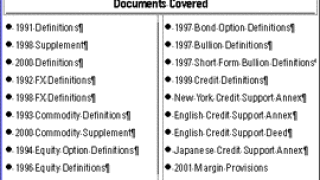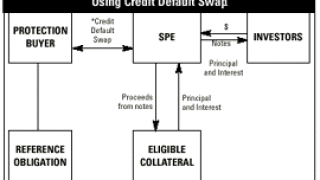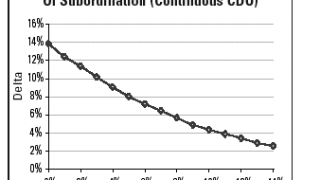Learning Curve
-
Earlier this month the China Banking Regulatory Commission (CBRC) announced the promulgation of the much anticipated "Interim rules on Derivative Business of Financial Institutions," the first major regulations governing derivatives business in China.
-
Constant maturity default swaps are a new credit derivative instrument that bifurcates credit risk into spread and default components.
-
With just three weeks to go until the scheduled deadline for adherence to the International Swaps and Derivatives Association's 2002 Master Agreement Protocol, now more than ever is the time for market participants to consider signing up.1
-
-
The U.S. securities laws prohibit underwriters from selling shares into the public market without the issuer registering the sale under the Securities Act of 1933 or obtaining an exemption from the Securities Act's registration requirements.
-
Whilst the use of over-the-counter derivatives in the retail savings and pensions markets could hardly be considered innovative, there is a residual reticence amongst trustees and managers of unit trusts and pension funds to commit fully to the use of derivative products, particularly more exotic products, as part of their long-term investment strategies.
-
In recent years, Chinese financial institutions, mainly the major banks, have been increasingly engaged in over-the-counter derivatives.
-
The rapid growth of credit correlation products such as single-tranche CDOs has in part been the result of improvements in analytics allowing the risk of such products to be managed with greater accuracy and efficiency.
-
Derivatives are important risk management tools that have made it possible for financial and non-financial institutions to buy and sell exposures, thereby diversifying their risk portfolio and reducing earnings volatility.
-
Recent corporate scandals, including the fall of Enron, have focused attention on the role of attorneys who represent public companies. The American Bar Association Model Rules of Professional Responsibility were amended in August to permit lawyers to reveal confidential client information to prevent the client from committing a financial crime or fraud and to require a lawyer to refer violations of law by employees of the client to higher authorities within the organization.
-
Pricing-orientated payoff computer languages form the vast majority of existing financial product language implementations, but they face serious limitations for valuing structured products on past, present, and future dates. A new class of context-neutral contract computer languages offers key properties to overcome the challenges of time travel.
-
This article looks at correlation, default rates and recovery assumptions in structured finance CDOs. Last week's examined the basic features and why they are attractive to investors. The analysis of default correlation for structured products suffers from a lack of historical data. Structured finance securities are backed by diversified asset pools, which by definition are less exposed to idiosyncratic events. The lower the idiosyncratic events in the portfolio, the higher the correlation of these asset classes. For this reason, correlation between ABS usually is considered higher compared to corporate credits.







